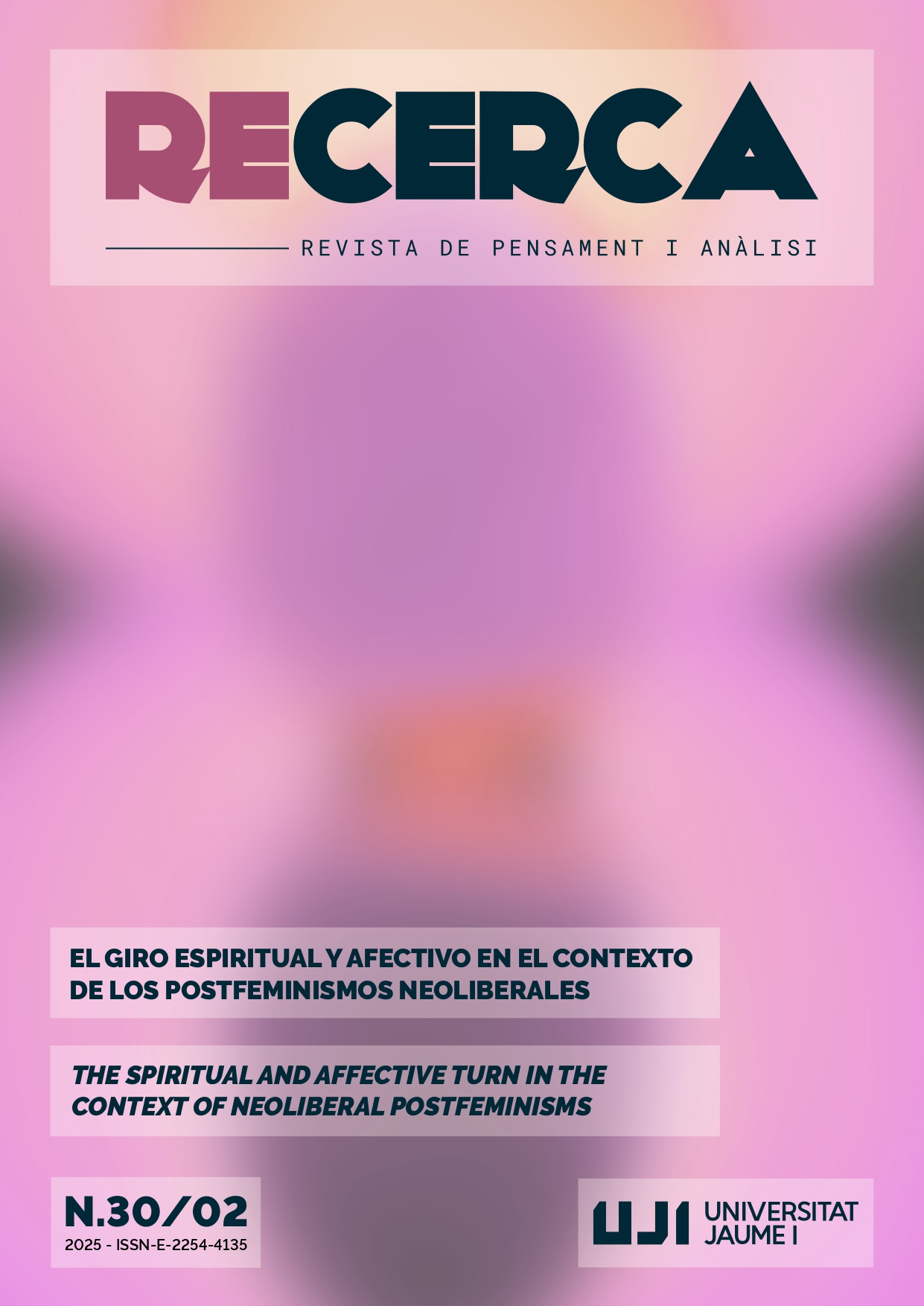Affective Economies in the Digital Media A Study on the Incel Community based on Sara Ahmed
Main Article Content
Abstract
This article explores the operation of affective economies through the case of study of the incel community. Based on the thinking of Sara Ahmed, it analyses how hatred, materialised in misogyny, serves the purpose of aligning some bodies with others and against others, generating antagonistic identities that, through a process of intensification due to the accumulation of affective value, lead to violent dynamics. In order to account for the impact of the digital medium in such relations, the collective and communitarian character of this social group will be problematised through the lens of Franco “Bifo” Berardi. Thus, the article highlights how the digital circulation of hate and its objects, while connecting subjects, defines them as individuals, contributing, in turn, to the continuation of the neoliberal regime.
Downloads
Article Details
References
Ahmed, Sara (2004). Affective Economies. Social Text, 22(2), 117139.
Ahmed, Sara (2017). La política cultural de las emociones. Ciudad de México: Centro de Investigaciones y Estudios de Género. Trad. Cecilia Olivares Mansuy.
Arias Maldonado, Manuel (2024). Afectos digitales. En Gómez Ramos, Antonio y Velasco Arias, Gonzalo (Eds.). Atlas político de emociones, (40-49). Madrid: Editorial Trotta.
Ávila Bravo-Villasante, María (2024). Machoesfera, discursos de odio y algoritmización de la esfera pública. Teknokultura. Revista de Cultura Digital y Movimientos Sociales, 21(1), 69-77. https://doi.org/10.5209/tekn.90501
Baele, Stephane, Brace, Lewys y Coan, Travis G. (2019). From “Incel” to “Saint”: Analyzing the violent worldview behind the 2018 Toronto attack. Terrorism and Political Violence, 33(8), 16671691. https://doi.org/10.1080/09546553.2019.1638256
Bates, Laura (2023) Los hombres que odian a las mujeres. Incels, artistas de la seducción y otras subculturas misógina online. Madrid: Capitán Swing.
Berardi, Franco «Bifo» (2017). Fenomenología del fin. Sensibilidad y mutación conectiva. Buenos Aires: Caja Negra.
Berlant, Lauren Gail (2008). The Female Complaint. The Unfinished Business of Sentimentality in American Culture. Durham: Duke University Press.
Cottee, Simon (2020). Incel (E)motives: Resentment, Shame and Revenge. Studies in Conflict & Terrorism, 44(2), 93114. https://doi.org/10.1080/1057610X.2020.1822589.
Cushman, Thomas (2012). Intellectuals and Resentment toward Capitalism. Society, 49, 247-255. https://doi.org/10.1007/s12115-012-9538-8.
Cvetkovich, Ann (2012). Depression: A Public Feeling. Durham: Duke University Press.
Esposito, Roberto (2003). Communitas. Origen y destino de la comunidad. Buenos Aires: Amorrortu editores.
European Commission (2021) Informe “Incels: A First Scan of the Phenomenon (in the EU) and its Relevance and Challenges for P/CVE”. Radicalisation Awareness Network. https://home-affairs.ec.europa.eu/system/files/2021-10/ran_incels_first_scan_of_phenomen_and_relevance_challenges_for_p-cve_202110_en.pdf
Freud, Sigmund (2000). Obras completas. Buenos Aires: Amorrortu editores.
García-Mingo, Elisa y Díaz Fernández, Silvia (2023). Cartografía de investigación sobre misoginia online y Manosfera en España: Mirando al futuro. Masculinidades y Cambio Social, 12(3), 293309.
Halpin, Michael (2022). Weaponized Subordination. How Incels Discredit Themselves to Degrade Women. Gender & Society, 36(6), 813-837. https://doi.org/10.1177/08912432221128545
Hernández López, Gala (2022). La mecánica de los fluidos. [Archivo de vídeo]. Tráiler recuperado de: https://www.youtube.com/watch?v=D6lrXg7oneo [Consultado el 27 de agosto de 2024].
Illouz, Eva (2020). El fin del amor. Una sociología de las relaciones negativas. Madrid: Katz Ediciones.
Lacan, Jacques (1977). Écrits. A Selection. Londres: Tavistock.
Lara, Ali y Enciso Domínguez, Giazú. (2013). El giro afectivo. Athenea Digital, 13(3), 101119. https://doi.org/10.5565/rev/athenead/v13n3.1060
Lehmann, Hauke, Roth, Hans y Schankweiler, Kerstin (2019). Affective economy. En Slaby, Jan y von Scheve, Christian (Eds.). Affective Societies. Key Concepts (140-151). Londres: Routledge.
Lewis, Helen (7 de agosto de 2019). To Learn About the Far-Right, Start With the “Manosphere”. The Atlantic. Recuperado de: https://www.theatlantic.com/international/archive/2019/08/anti-feminism-gateway-far-right/595642/ [Consultado el 28 de agosto de 2024].
Llevadot, Laura (2022). Mi herida existía antes que yo: Feminismo y crítica de la diferencia sexual. Barcelona: Tusquets Editores.
Lordon, Fréderic (2017). Los afectos de la política. Zaragoza: Prensas de la Universidad de Zaragoza.
Macón, Cecilia (2013). Sentimus ergo sumus. El surgimiento del «giro afectivo» y su impacto sobre la filosofía política. Revista Latinoamericana de Filosofía Política, II(6), 1-32.
Massumi, Brian (2002). Parables of the Virtual. Movement, Affect, Sensation. Durham: Duke University Press.
Medialab-Prado (31 de enero de 2008). Delgado, Manuel: Lo común y lo colectivo. [Archivo de vídeo]. Recuperado de: https://www.youtube.com/watch?v=FLoOgWv4mlY [Consultado el 27 de agosto de 2024].
Mouffe, Chantal (1999). El retorno de lo político. Comunidad, ciudadanía, pluralismo, democracia radical. Barcelona: Paidós.
Pacharissi, Zizi (2015). Affective Publics. Sentiment, Technology, and Politics. Oxford: Oxford University Press.
Prada, Juan Manuel (2011). ¿Capitalismo afectivo? EXIT Book: revista de libros de arte y cultura visual, 15, 32-37.
Tomkins, Silvan (1963). Affect, Imagery, Consciousness: The Negative Affects, vol. 2. Nueva York: Springer.
Ramas San Miguel, Clara (2024). Odio. En Gómez Ramos, Antonio y Velasco Arias, Gonzalo (Eds.). Atlas político de emociones (353362). Madrid: Editorial Trotta.
Read, Jason (2023). The Affective Reproduction of Capital: Two Returns to Spinoza. En Seigworth, Gregory J. y Pedwell, Carolyn (Eds.). The Affect Theory Reader 2. Worldings, Tensions, Futures (367-383). Durham: Duke University Press.
Slaby, Jan y von Scheve, Christian (2019). Affective Societies. Key Concepts. Londres: Routledge.
Solana, Mariela (2016). Reflexiones sobre el giro afectivo en historia queer. Mora, 22(1), 1-16.
Spinoza, Baruj (2000). Ética demostrada según el orden geométrico. Madrid: Editorial Trotta.
Sugiura, Lisa (2021). The Incel Rebellion. The Rise of the Manosphere and the Virtual War Against Women. Leeds: Emerald Publishing Limited.
Weber, Max (2002). Economía y sociedad. Esbozo de sociología comprensiva. Madrid: Fondo de Cultura Económica.
Zimmerman, Shannon (2024). The Ideology of Incels: Misogyny and Victimhood as Justification for Political Violence. Terrorism and Political Violence, 36(2), 166-179. https://doi.org/10.1080/09546553.2022.2129014


